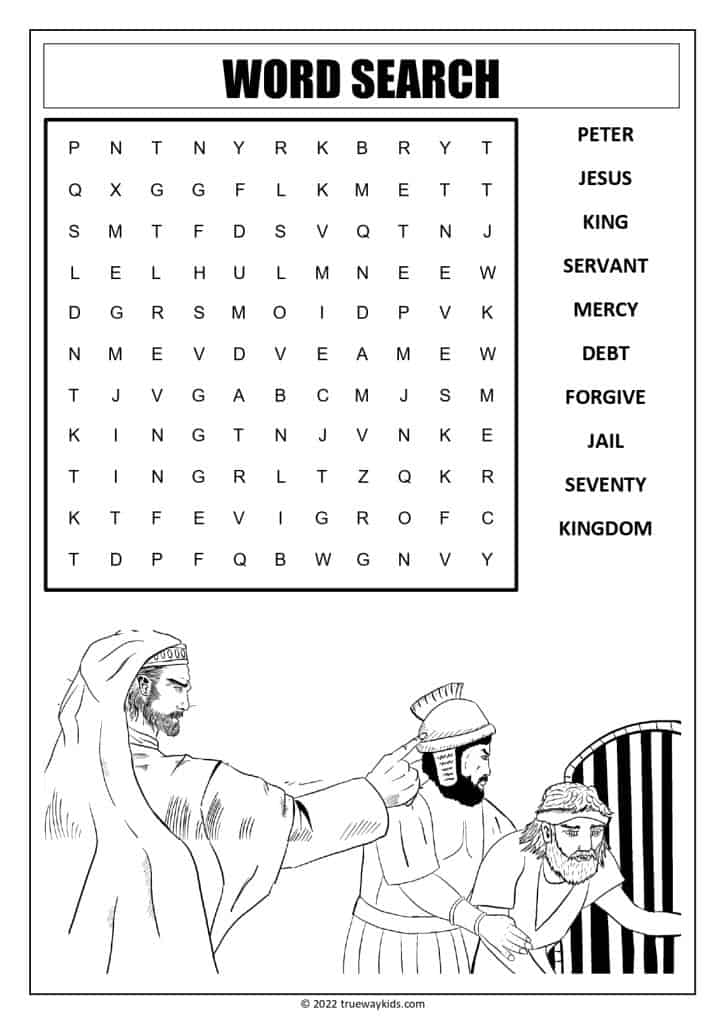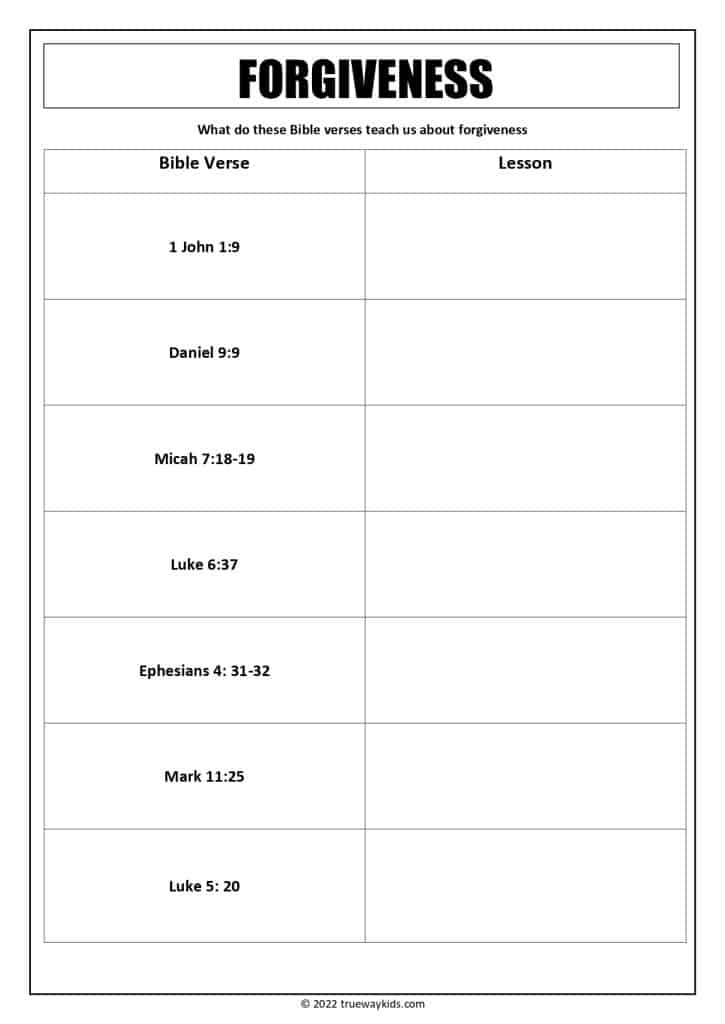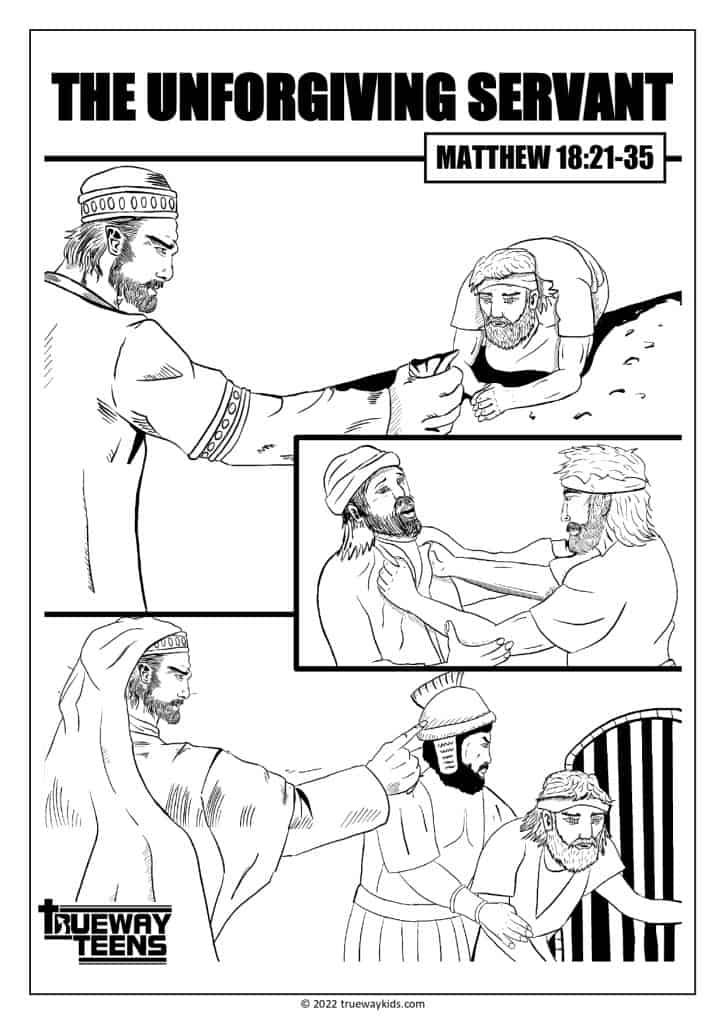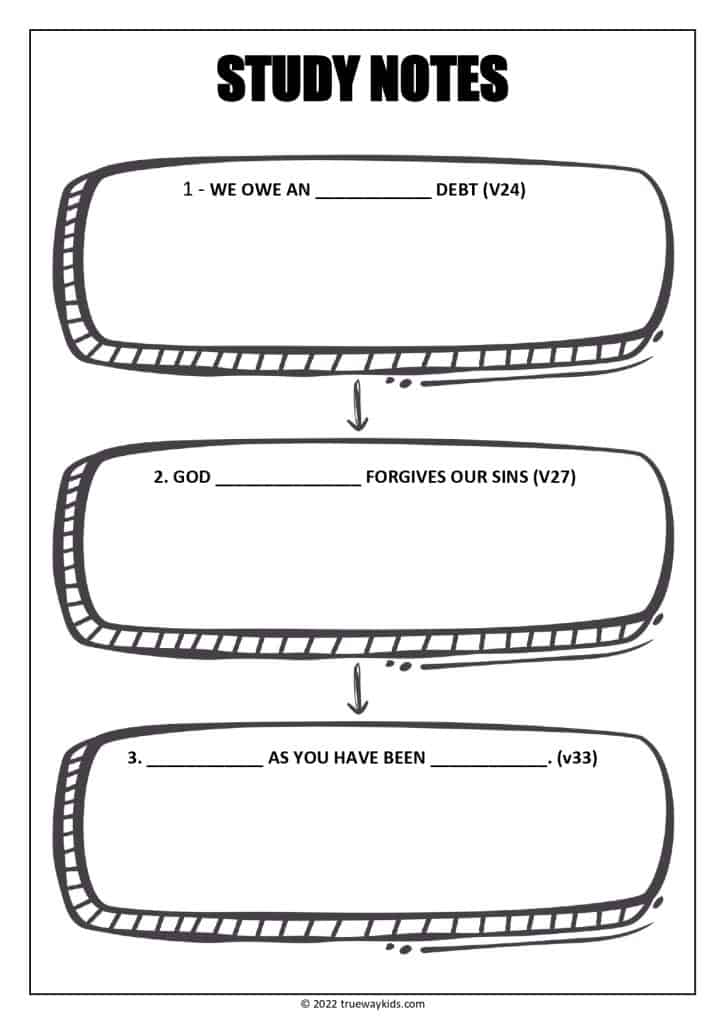In this lesson, we will learn about the Parable of the Unforgiving Servant. This lesson relates to pre-teens and teens and by the end of this lesson, they should have learnt about the following:
- We each owe a debt
- God forgives us through grace
- We should forgive others.
BIBLE PASSAGE: Matthew 18:21-35
MEMORY VERSES: Then Peter came and said to him, “Lord, how often shall my brother sin against me, and I forgive him? Until seven times?” Jesus said to him, “I don’t tell you until seven times, but, until seventy times seven. (Matthew 18:21-22)
DOWNLOAD THE FREE PRINTABLE LESSON

BIBLE STUDY NOTES FOR TEENS
The parable opens with a question from Peter, “Lord, if my brother sins against me, how often must I forgive him? As many as seven times?
Why did Peter say seven? In Jewish traditions, you should forgive a person who has sinned against you three times, so Peter thinks he’s being super generous. He expects to impress Jesus by double the required amount and adding one more time as a bonus.
But rather than congratulating Peter on his gracious attitude, Jesus responds by saying, “seventy times seven.” And just in case Peter was tempted to do the maths and think the answer was 490. Jesus tells this parable to show there’s no limit to forgiveness.
Jesus tells Peter the story of a servant and a king. The servant owes the king a huge and clearly un-payable debt. The king orders the servant and his family to be sold into slavery. The servant begs for more time. The king, being merciful, goes even further and cancels the debt.
The servant leaves and confronts a man who owes him a much smaller amount. The man can’t pay right away, so the servant chokes him, insists on payment, and throws him in prison.
The king can’t believe the servant would act in such a way after being forgiven of so much himself. He calls the servant wicked and asks him why he didn’t show the same mercy that he received, and this time treats the servant in line with the servants’ actions. The unforgiving servant is thrown in prison to be tortured to pay off his original debt.
KEY POINTS FROM THE PASSAGE
1. WE OWE AN UNPAYABLE DEBT (V24)
Jesus makes it clear that the servant’s debt was massive. Those listening would have had trouble imagining such a large amount of money. The servant could never have ever paid such an enormous debt.
The man owed the king ten thousand talents. A biblical talent was enough money that a man who owned it could be considered wealthy. Ten thousand talents were an astronomical amount of money. A talent is equivalent to 20 years’ worth of wages for the average worker. So, the man owed 200,000 years of labour! That is, if he didn’t spend any of the money he earned. Some say it would have been billions of dollars in today’s money. Regardless of the actual amount, Jesus’ point is it was unpayable. The man could never pay his debt.
When the servant begged for more time to repay the debt, it was a meaningless gesture given that it would have taken 200,000 years to pay.
One of the greatest lies that people believe today is that by doing good or following rules of a religion, they can earn back their standing with God and pay off any wrong they have done. The idea is that we can do enough good to outweigh the bad. But the Bible teaches, ‘We have all become like one who is unclean, and all our righteous deeds are like a polluted garment.’ (Isaiah 64:6).
The debt of sin is so large, no amount of good works would be able to pay it. It is as ridiculous for us to try and pay our debt of sin as the servant to try and pay 200,000 years of work.
2. GOD GRACIOUSLY FORGIVES OUR SINS (V27)
The king in the parable had three options when the servant begged for more time. He could respond with justice, mercy, or grace.
- Justice – Justice means totreat others fairly according to what they serve in the law. The servant owed the debt, and the law demanded it is paid. Justice would have meant a life of slavery for the servant.
- Mercy – Mercy means to be delivered from the judgment rightfully deserved. The king could have allowed the servant more time to pay his debt and not have him and his family sold into slavery.
- Grace – Grace means unmerited favour. It is giving what is undeserved. The king didn’t grant the servant’s request for more time. He cleared the debt altogether.
We cannot earn God’s grace. Ephesians 2:8 remind us “For by grace you have been saved through faith. And this is not your own doing; it is the gift of God.”
We all have sinned and fallen short of the glory of God. (Romans 3:23) and ‘the wages of sin is death, but the free gift of God is eternal life in Christ Jesus our Lord. (Romans 6:23).
Jesus carried our debt of sin and paid for it all on the cross. As the hymn says,
I had a debt I could not pay,
He paid the debt He did not owe,
I needed someone,
To wash my sins away.
3. FORGIVE AS YOU HAVE BEEN FORGIVEN. (v33)
Most of us have said these words while saying ‘The Lord’s Prayer’, “And forgive us our debts, as we forgive our debtors.” Matthew 6:12.
Jesus challenges us to pray in such a way that whenever we ask God to forgive us, we challenge ourselves to do the same for others.
Forgiveness is never easy. We feel the pain and hurt caused by the selfish and often sinful actions of others. Furthermore, when we hear of some of the things happening in the world, we can easily think, “I can forgive many things, but I can’t forgive that!”
Colossians 3:13 says, “forgive each other; as the Lord has forgiven you.” Through this parable, Jesus teaches Peter and us that God’s forgiveness of our sins should motivate us to forgive those who offend us.
The servant was forgiven 200,000 years of debt. The way he treated the man who owed him only a hundred days pay was unbelievable. The king asks him, “should not you have had mercy on your fellow servant, as I had mercy on you?’
For most of us, forgiveness is not something that comes naturally. But the way God has forgiven us should motivate us to forgive others who sin against us.
CONCLUSION It will never be easy to forgive others, but it is something we must do. In this parable, Jesus challenges us to truly understand our own sinfulness and remember our need for forgiveness. It is only when we fully appreciate God’s grace to us that we will be able to forgive others.
Listen to the study
YOUTH GAMES AND ACTIVITIES FOR THE UNFORGIVING SERVANT
FORGIVENESS TAG
- Select two players.
- The first will be a debt collector the other the forgiver.
- All other players should run around the room.
- The debt collector tags another player, they must freeze in jail.
- If the forgiver tags the person in jail, they are free and become a forgiver. Game continue until everyone has been forgiven.
ROLEPLAY FORGIVENESS
- Pick two people and give them a scenario.
- For example. Emma is mad with Sarah because she didn’t come to her party.
- The person A (Emma) asks person B (Sarah) questions such as why they did what they did? What emotions might he have been feeling? Is there a bigger reason?
- Person B should try to answer with genuine reasons and not excuses. The goal is to practice empathy rather than excuse bad behaviour.
BIGGER OR SMALL
- Have all players sitting in a circle.
- Role two dice on the table.
- The first player should then pick up the dice and guess if they will roll a bigger or smaller number.
- If they guess correctly, they remain in the game, if they are wrong, they are out.
- Keeping passing the dice around the circle and repeating until only one player remains.
- Talk about how the servants owed much more than the other man.
Free printable Teen Worksheets in the lesson pack.








DOWNLOAD THE FREE PRINTABLE LESSON




